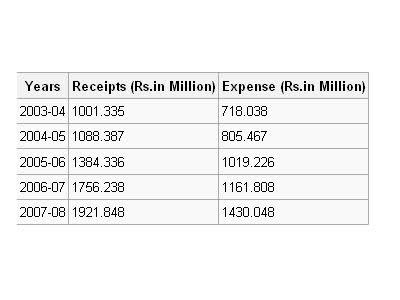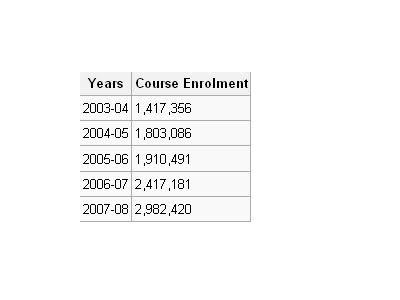Allama Iqbal Open University AIOU, founded in 1974, is a university in Islamabad, Pakistan. It is the world's largest university by enrollment with over 3 million students.
Contents :
* 1 History
Allama Iqbal Open University was established under an act of parliament in 1974 as a pioneer in non-formal and distance education in Pakistan. It was then the world's second open university; the first such university was established in the UK in 1969. Now there are 17 mega universities of the world and Allama Iqbal provides an opportunity for working people to enhance their qualifications without giving up their jobs or homes. In Pakistan distance education is particularly suited to the female population as it offers them an opportunity to study at home. Similarly, people living in the tribal and far-flung areas far from conventional educational institutions, also have an opportunity to be educated. In this university, the period for completing their certificates and degrees is linked with students’ own pace and convenience. The AIOU utilizes all possible media for instruction including correspondence materials, radio and TV, satellite transmission, online teaching, non-broadcast media, tutorial instruction and group training workshops and more.
The AIOU started with five courses and an enrolment of less than 1,000 in 1975-76, and it has over the past years expanded in all directions. At present the total number of programmes produced is 116, and courses, 1,377. In the year 2007-08, student enrolment reached 1,031,951 and course enrolment to 2,982,420, out of which the female participation rate has been 51 percent. Presently four sets of faculty in 36 academic departments and an Institute of Mass Education offer a wide range of courses from functional non-credit to M.Phil/Ph.D level. At present the university offers 19 Ph.D courses, 192 at M.Phil/MS, 516 Masters level, 67 in Teachers Education, 282 Bachelor/Diploma, 80 Higher Secondary School, 30 Secondary School, 12 Women's Middle Education, and 114 Functional Non-Credit/Women's Basic Education courses.
The University broadcast 264 radio and 382 T.V programmes in 2005-06. Recently the university has started to broadcast educational programmes on FM Radio at 91.6 MHz. The University has also established a video-conferencing network in seven select regions to conduct classes online for Computer Science courses. The regional network, at present, consists of 36 Regional Campuses /Centres with 82 part-time regional coordinating offices throughout the country. The university has by now established 1,274 study centres annually in coordination with formal educational institutions and study centres with latest computer lab facilities for the students studying in the fields of science, technology and/or computer sciences in collaboration with private institutions of high repute in all major cities of the country as well.
Approximately 950 examination centres are established yearly at Tehsil and District level with coordination of regional network to facilitate the students. Up to 2007, 1,121,382 degrees, diplomas and certificates have been awarded. Presently the sanctioned posts of the university number 1,899 including academicians, administrative and servicing/supporting staff. About 1.6 million books besides other allied materials are printed and supplied to the students yearly. The Central Library of the University is equipped with a collection of over 114,000 books. The annual recurring budget of the university for the Year 2007-08 is Rs.1921.848 million, of which the university generates 87 percent from its own resources. At present the endowment fund of the University is estimated at Rs.2.4000 billion.
With its system of reaching the students at their homes or workplaces and the concept of openness, implying lifelong education, the Allama Iqbal Open University is filling the gaps left by the conventional system and taking education to areas and groups unable to benefit from the formal system of education. As an institution of distance and open learning, AIOU makes a commitment to provide high quality educational programmes to its students. In addition the AIOU endeavours to create an environment suitable for learning.
In recent years, the university's programmes have expanded and still several others are in the process of development to be launched in the forthcoming semesters. The challenge at present for the future of the university is to maintain excellent standard of education by providing high quality tutorial and regional support to the students.
* 2 Administration and governance
Chancellor (President of Pakistan)
Pro-Chancellor (Federal Minister for Education, Ministry of Education)
Vice Chancellor (Chief Executive Officer/Head of the institution)
Executive Council (Governing Body)
* 3 Finance and budget
Revenue and Expenses

Source: Treasurer's Department (Budget Section) AIOU, Islamabad
* 4 Faculties and their departments
Faculty of Arabic & Islamic Studies Established in 1974, the Institute of Arabic & Islamic Studies has been divided into distinct disciplines to provide in-depth study and research and was upgraded as Faculty of Arabic & Islamic Studies in 1998 with the following departments:
• Arabic Language and Literature
• Hadith & Seerah
• Islamic Law (Fiqh)
• Islamic Thought, History & Culture
• Quran & Tafseer
Faculty of Education Established in 1984, the Faculty of Education's origin actually predates the university itself. A National Institute of Education was established in 1973 as an integral part of the Federal Ministry of Education, with the objective of improving education at school levels through in-service training of Master Trainers. This Institute later became a part of the university in June 1975. The Faculty of Education has following departments:
• Adult and Continuing Education
• Distance and Non-Formal Education
• Educational Planning and Management
• Science Education
• Special Education
• Teacher Education (Secondary)
• Teacher Education (Elementary)
Faculty of Sciences Recently renamed as Faculty of Sciences, the Faculty of Basic and Applied Sciences was established in 1982. It comprises the following nine departments:
• Agricultural Sciences
• Biology
• Chemistry
• Computer Sciences
• Engineering and Technology
• Environmental Sciences
• Home and Health Sciences
• Mathematics and Statistics
• Physics
Faculty of Social Sciences and Humanities The Faculty of Social Sciences and Humanities was established in 1982, initially with only a few departments. A whole spectrum of new courses and programmes was later developed that necessitated the establishment of new departments. At present, there are thirteen departments working in this faculty:
• Business Administration
• Commerce
• Economics
• English Language & Applied Linguistics
• History
• Iqbal Studies
• Library & Information Sciences
• Mass Communication
• Pakistan Studies
• Pakistani Languages
• Sociology, Social Work & Population Studiess
• Urdu
• Womens Studies
* 5 List of academic programs on offer
The university has introduced a wide range of undergraduate, graduate, Master’s, M.Phil, and Doctoral Programmes. These programmes have given distinction to the university in relation to other educational institutions of Pakistan as it caters to the need of all age groups and levels of education. These programmes are listed below.
Ph.D Programmes Based on M.Phil Degree
• Iqbal Studies
• Urdu
• Mass Communication*
• Distance and Non-Formal Education (DNFE)
• Teacher Education (Secondary)
• Educational Planning and Management (EPM)
• Special Education
• Agricultural Extension
• Statistics*
• Mathematics*
• Islamic Studies
• Arabic
Based on Master Degree
• Mass Communication*
• Distance and Non-Formal Education (DNFE)
• Teacher Education (Secondary)
• Educational Planning and Management (EPM)
• Special Education
• Food and Nutrition
• Chemistry
• Computer Science
• Statistics*
• Islamic Studies
M. Phil Programmes
• Islamic Studies
• Iqbal Studies
• Urdu
• Teacher Education (Secondary)
• Educational Planning and Management
• Distance and Non-formal Education
• Special Education
• Mass Communication
• Statistics
• Economics
• Chemistry
• Food and Nutrition
• Pakistani Languages and Literature
M. Sc. (Hon.) 17–Year Education
1. Agriculture Extension (Regular classes at main campus)
2. Live Stock Management (AIOU, Islamabad)
3. Rural Development (For continuing students only)
MA/MSc 16-Year Education Master of Science (M.Sc.)
1. Pakistan Studies
2. Mass Communication
3. Economics
4. Community Health and Nutrition
5. Physics
6. Forestry Extension
7. Environmental Design
8. Sociology
9. Mathematics
10. Chemistry
11. Statistics
12. Womens Studies
Master of Arts (M.A.)
1. Teaching of English as a Foreign Language (TEFL)
2. History
3. Islamic Studies
4. Arabic
5. Urdu
6. Teacher Education
7. Educational Planning and Management (EPM)
8. Distance and Non-Formal Education
9. Special Education
10. Business Administration (MBA)
11. MBA (Banking & Finance)
12. MBA (Information Technology)
13. Commonwealth Executive MBA
14. Commonwealth Executive MPA
15. Library and Information Sciences (MLIS)
M.Ed Programme 1. Teacher Education (Secondary)
2. Distance and Non-formal Education
3. Special Education
4. Science Education
Postgraduate Diplomas (PGD)
1. Teaching of English as a Foreign Language (TEFL)
2. Dietetics (For Dieticians)
3. Nutrition (For Physicians)
4. Women Studies*
5. Mass Communication
6. Educational Planning and Management (EPM)
7. Computer Science (Online)
8. Commonwealth Executive Business Administration
9. Commonwealth Executive Public Administration
10. Environmental Design
11. Youth in Development Work (only at Rawalpindi/Islamabad)
Teacher Education Programmes 1. Bachelor of Education (B.Ed General)
2. Bachelor of Education (B.Ed Arabic)
3. Certificate of Teaching (CT)
4. Diploma in Education (10+3 Model)
5. Primary Teaching Certificate (PTC)
6. Arabic Teachers Training Course (ATTC)
Bachelor Degree Programmes 1. B.A. (General)
2. B.Com. (Commerce)
3. B.B.A. (Business Administration) (Regular classes)
4. B.M.C. (Bachelor of Mass Communication)
5. B.L.S. (Bachelor of Library & Information Sciences)
6. B.A. (Dars-e-Nizami)
7. Bachelor of Engineering (Telecommunication) (Regular classes)
8. Bachelor of Technology (Automobile)*
9. Foundation Semester (BS-CS) (For below 45% marks at intermediate level)
10. Bachelor of Science (Computer Science) BS (CS)
11. B.Sc. in Vision Sciences
Diplomas (Undergraduate)
1. Vision Sciences leading to B.Sc.
2. Computer Graphics
Secondary School Certificate (SSC) 1. H.S.S.C (General)
2. H.S.S.C. (I.Com)
3. H.S.S.C. Dars-i-Nizami
4. F.Sc. Family and Community Health
5. Home Economics
6. F.Sc. Pre-Medical
7. F.Sc. Pre-Engineering
SSC (Matric)
1. S.S.C (General)
2. S.S.C (Dars-e-Nizami)
3. S.S.C (Health)
4. S.S.C (Home Economics)
Middle Education This programme is under Pilot launching at two different provinces
Certificate Level Courses
1. Certificate in Librarianship
2. French Online
3. Selling of Homemade Products
4. Arabic Bol Chaal
5. Al-Lisan-ul-Arabi
6. Computer Graphics
Another feature of the University’s programmes is the provision of non-credit courses of six-month duration, which there are mainly three types i.e.
1. Functional Non-credit Courses
2. Technical Course
3. Agricultural Course
Open Tech. Courses (Non-credit) The university has been offering over 43 courses in this programme. (For students of Rawalpindi & Islamabad only)
Short Term Educational Programmes (STEPS) The University has developed and launched about 90 STEPS courses in the following areas of studies:
1. Management Sciences (22 courses)
2. Social Sciences (15 courses)
3. Hotel Services (05 courses)
4. Community Education (17 courses)
5. Agricultural Courses (06 courses)
* 6 Enrolment and success
Course Enrolment Trend

Back to Top
|